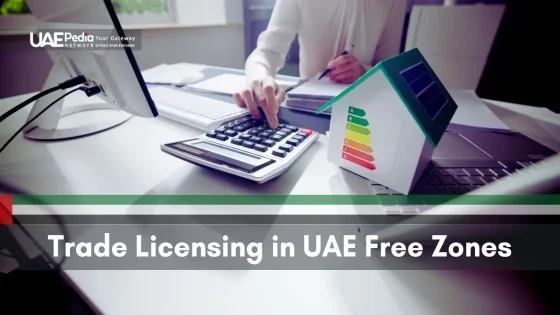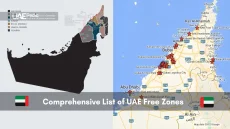Ever wondered about auditing in UAE’s free zones? Most free zone companies, like FZCO and FZE, must have audits. This is key to getting the Free Zone Person status and avoiding corporate taxes.
To keep your business in top shape, you need to follow audit rules. This makes sure your financial records are accurate and your business runs well.
Free zone companies in the UAE must use auditors approved by the Free Zone Authority. This ensures a detailed check of their finances. Places like DMCC and JAFZA have different rules, but they all aim for the same thing: clear records, following rules, and success.
Understanding Free Zone Audit Regulations in the UAE
The UAE’s free zones draw businesses from all over. Knowing audit rules is key. The main law is the Commercial Companies Law No 32 of 2021.
Legal Framework and Compliance Standards
DMCC, DWC, DAFZA, JAFZA, and DSO free zones need annual audits. These checks make sure money reports are clear and follow global standards. Keeping financial records for 5 years is a must in UAE free zones.
Differences Between Mainland and Free Zone Audit Requirements
Mainland companies must do annual audits. But, free zones might have easier rules. Still, keeping good records is important, even if an annual audit isn’t needed. Following free zone rules helps avoid fines.
Record Keeping and Documentation Guidelines
Free zone companies must keep detailed financial records. They might need to show these records when renewing licenses. Keeping records well helps with audits and staying compliant.
| Audit Requirement | Mainland UAE | Free Zones |
|---|---|---|
| Annual Audit | Mandatory | Varies by free zone |
| Accounting Records Retention | Minimum 5 years | Minimum 5 years |
| Alignment with IFRS | Required | Required |
Knowing audit regulations in UAE free zones helps businesses stay compliant. It reduces risks and keeps financial reports clear. Whether in DMCC, DWC, or other free zones, being informed is key to success.
Auditing in Free Zones: Mandatory Requirements and Procedures
Hey there, Free Zone Companies (FZCO) and Free Zone Establishments (FZE)! It’s time to make sure your books are in order. Auditing is a must for businesses in the UAE’s free zones. This is because you get to enjoy 0% Corporate Tax (under certain conditions).
The audit process checks your financial records to make sure they meet standards. You’ll need a good auditor who knows what they’re doing. They’ll look at your books closely to see if everything is right.
Getting audited has lots of benefits. It keeps your free zone status and shows you how your finances are doing. You’ll also need these statements for license renewals.
So, whether you’re new or experienced in free zones, make sure you audit well. Your accountant will be happy, and so will your profits!
There are many types of audits in UAE free zones. These include financial, internal, compliance, and special-purpose audits. Each one has its own purpose. Make sure you know what your business needs.
- Financial audits make sure your financial health is reliable.
- Internal audits check if your company is running well.
- Compliance audits make sure you follow rules and standards.
- Special-purpose audits focus on specific areas like the environment or IT.
So, what are you waiting for? Start your audit process and show the free zone authorities what you’re made of!
Key Audit Submission Deadlines and Requirements by Free Zone Authority
As entrepreneurs in the UAE, knowing your audit deadlines is key. Each free zone has its own rules. Let’s look at the important details.
JAFZA and DWC Submission Timeline
For JAFZA and DWC, you have 90 days after your financial year ends. This is your deadline for audited statements. Remember, time is of the essence!
DMCC and RAKEZ Compliance Requirements
DMCC and RAKEZ have different rules. DMCC gives you 180 days, while RAKEZ and DDA offer 6 months. But, deadlines can change. Always check with your free zone.
Document Preparation and Submission Process
Preparing your audit documents is like packing for a trip. Everything must be in order. Choose a registered UAE audit firm and submit your reports before the deadline. Missing deadlines can cost you a lot, so stay alert!
| Free Zone | Submission Deadline | Penalties for Late Submission |
|---|---|---|
| JAFZA and DWC | 90 days after the end of the financial year | Fines and potential license suspension |
| DMCC | 180 days after the end of the financial year | $2,700 penalty after 25+ days late, $5,400 penalty after 90+ days late |
| RAKEZ and DDA | 6 months after the end of the financial year | Fines and potential license suspension |
Corporate Tax Implications and Audit Standards for Free Zone Companies
Get ready for a wild ride in the UAE’s Corporate Tax world. Free Zone companies now face new rules. They must stay tax-free by following strict guidelines.
To keep your tax rate at 0%, your books must be perfect. You need to submit audited financial statements. This is required if your income is over AED 50,000,000 or if you want to be a Qualifying Free-Zone Person.
Your audit is like a map to avoid tax trouble. Following the audit standards keeps you safe. So, are you ready to tackle the UAE’s Corporate Tax challenges head-on?



















